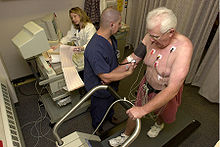Stress Test
 A stress test can be used to test for heart disease. Stress tests are tests performed by a doctor and/or trained technician to determine the amount of stress that your heart can manage before developing either an abnormal rhythm or evidence of ischemia (not enough blood flow to the heart muscle).
A stress test can be used to test for heart disease. Stress tests are tests performed by a doctor and/or trained technician to determine the amount of stress that your heart can manage before developing either an abnormal rhythm or evidence of ischemia (not enough blood flow to the heart muscle).
Why Do I Need a Stress Test?
Your doctor uses the stress test to:
- Determine if there is adequate blood flow to your heart during increasing levels of activity.
- Evaluate the effectiveness of your heart medications to control angina and ischemia.
- Determine the likelihood of having coronary heart disease and the need for further evaluation.
- Check the effectiveness of procedures done to improve blood flow within the heart vessels in people with coronary heart disease.
- Identify abnormal heart rhythms.
- Help you develop a safe exercise program.
What Types of Stress Tests Are Provided at our clinic?
- Stress echocardiogram: An echocardiogram (often called "echo") is a graphic outline of the heart's movement. A stress echo can accurately visualize the motion of the heart's walls and pumping action when the heart is stressed; it may reveal a lack of blood flow that isn't always apparent on other heart tests.
- Nuclear stress test: This test helps to determine which parts of the heart are healthy and function normally and which are not. A very small and harmless amount of radioactive substance is injected into the patient. Then the doctor uses a special camera to identify the rays emitted from the substance within the body; this produces clear pictures of the heart tissue on a monitor. These pictures are done both at rest and after exercise. Using this technique, a less than normal amount of thallium will be seen in those areas of the heart that have a decreased blood supply.
The goal of the stress test is to raise your heart rate to determine if blood flow is reduced in the arteries that supply blood to your heart. Your heart rate is raised through exercise, by having you walk on a treadmill.
When you schedule your test, it is important to mention what medicines you take. Ask if you should take any before the test. If your test is scheduled before 12 noon, you should not eat or drink anything after midnight. If your test is scheduled for after 12 noon, you may have an early (before 8am) light breakfast. You should not eat or drink caffeine products or smoke within 24 hours of your test. We recommend that you wear walking shoes and a comfortable two-piece outfit. During the test - Small pads called electrodes are placed on your upper body to monitor your heart rate. After being shown how to use the treadmill, you will exercise for several minutes. While at first the exercise is at an easy pace, it slowly gets more difficult. Your heartbeat and blood pressure are monitored during and after the test. Total test time is approximately 45 minutes.
After the test - As soon as the test is over, you may eat and return to your normal routine. Ask your doctor about taking any medicine that you were told to skip before the test.







